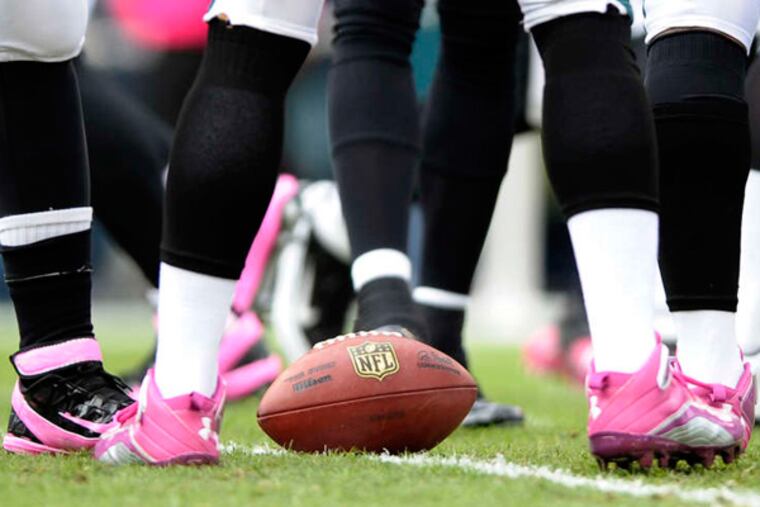GreenSpace: How to enhance breast cancer education and prevention
As the nation becomes saturated with pink this month - for breast cancer awareness - likely nowhere is it as eye-popping as on the fields of the National Football League.

As the nation becomes saturated with pink this month - for breast cancer awareness - likely nowhere is it as eye-popping as on the fields of the National Football League.
Or, perhaps, as unsatisfying.
The footballs have pink-ribbon logos. The goalposts are padded in pink. Players can choose from a plethora of pink gear - gloves, shoelaces, helmet decals, and more.
The NFL reports that in four years, $4.5 million has been raised through sales of game gear and other pink paraphernalia.
The money is donated to the American Cancer Society for screening and outreach. In this area, the money enabled Camden's CAMcare Health Corp. to reach hundreds of women and give mammograms to 116.
The Eagles have added $1.7 million to local efforts.
But Pinkland isn't all rosy.
Some critics say the pink gusher is too glib, too commercial. And that the cheery, gung-ho tone leads not to better education, care, and prevention, but to complacency.
Considering the huge sums generated by major league football, critics say, the pink proceeds are but a pittance.
Some contend the NFL's goal is getting women to pay more attention not just to breast cancer, but to football.
Two advocacy groups, Breast Cancer Action and the Breast Cancer Fund, have launched campaigns aimed at toning down the rah-rah and pushing for more substance.
With one in eight women expected to be diagnosed during her lifetime, and 250,000 new diagnoses a year, "you'd be hard-pressed to find a person who is unaware of breast cancer," said Action's executive director, Karuna Jaggar. "What we need now is real education. What we need to do is get to the root causes."
In 2002, Breast Cancer Action started "Think Before You Pink," urging scrutiny of companies that sell pink- ribbon products but that donate little money or, worse, put the logo on products with chemicals linked to an increased risk of breast cancer.
The Breast Cancer Fund's "Beyond the Pink" focuses on prevention. Fund president Jeanne Rizzo cochaired a national committee that released a report in February that urged putting more research money toward investigating environmental factors, including pesticides, bisphenol A, flame retardants, and other endocrine- disrupting chemicals thought to affect the breast.
Never mind the pink shoelaces. "I would like every football player to say, 'I'm going to go home and look at what's in my house that my daughter's exposed to,' " Rizzo said.
When she thinks of her granddaughters, her wish isn't that they get good treatment some day. It's that they not get breast cancer in the first place.
An online tool kit explores chemicals of concern in shampoos, household cleaners, plastics, and other products.
Both groups support congressional legislation championed for years by late New Jersey Sen. Frank R. Lautenberg to update regulations on toxic chemicals.
We are "constantly awash" in chemicals, and the evidence linking many to cancer is mounting, Rizzo said. In 2002, the fund's first report on the state of scientific evidence listed just 138 citations. "That represented pretty much what was out there," she said.
An update on the group's website lists 900-plus citations, "and that's just a portion of the science," she said. "We've had reaffirming, revalidating science continuously."
Absent research on humans - "I don't want to say to you and your family, 'You be the exposed group' " - lab results should be enough to put on the brakes, Rizzo said.
"When you see a chemical that causes breast cells in a petri dish to become cancerous, that should be enough. When you see workers who are exposed in factories and have increased cancer risk, I'm saying that's enough."
Others say there's still more work to be done on awareness. "That's why women are dying. They're getting to the doctor too late," said Massimo Christofanilli, head of the Jefferson Breast Care Center. "Any initiative that can increase awareness, education, and attention . . . should not be criticized."
American Cancer Society spokeswoman Tara Peters said the exposure alone via the NFL was "close to half the population of the U.S." Given last year's 10,000 screenings in 17 cities, "this is awareness with teeth."
At the Eagles game next Sunday, Thomas Jefferson University Hospital volunteers will sell pink hats, ties, and scarves. On the field, 20 breast cancer survivors will hold a large pink ribbon by two American flags during the national anthem.
215-854-5147 @sbauers